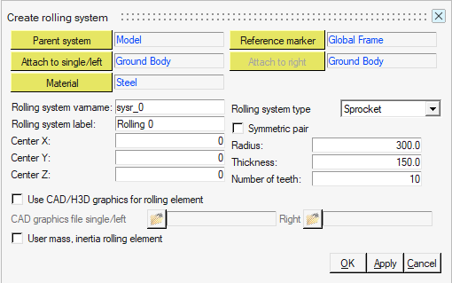Rolling Systems

Six different rolling systems are available to be used in the track builder,
Sprocket, Double Sprocket, Idler, Roller, Wheel, and Double Wheel.
- Sprockets/Double Sprocket
- Profiled wheel with teeth, or cogs, that mesh with a track.
- Idler
- A wheel that is used to alter the path of the track or to increase the wrap angle.
- Roller
- A small wheel used to prevent the catenary hang of the track and support the load of the track.
- Wheel/ Double Wheel
- Transfers the vehicle weight to the track.
The symmetric pair option enables the creation of two
rolling systems representing a pair symmetry to the X-Z plane.
Note: The created pair systems are not MotionView pair entities,
but systems duplicated and positioned in the symmetric plane. The symmetric pair option is
not recommended to represent a double system in the same track, when that representation
is needed, use the double sprocket or double wheel instead of single wheel with the
symmetric pair option.
The Rolling elements are built as a combination of
primitive geometries. The Use CAD/H3D graphics for rolling element
option enables adding CAD or H3D Graphics to the rolling system. Based on the symmetric pair
option, the CAD graphics can be added in the left of right side of the rolling element.
Note: To properly position CAD graphics in the rolling system, make sure
the center of the CAD graphics is positioned at the global origin (0,0,0 in XYZ
coordinate) before including in the rolling system.
Mass and inertia for the rolling system are calculated based on the provided geometric dimensions or CAD Graphics. Alternatively, user-defined mass and inertia can be provided using the option User mass, inertia rolling element, in this case the rolling systems bodies must be edited to include the mass and inertia properties.
The properties of the rolling system can be modified in the dataset under the rolling system after the system has been created.